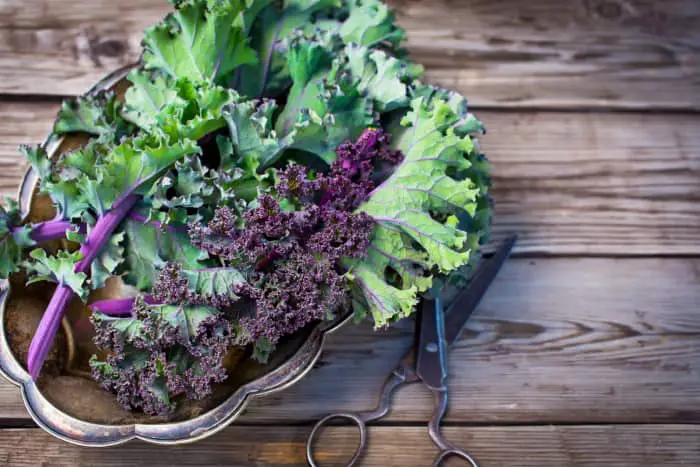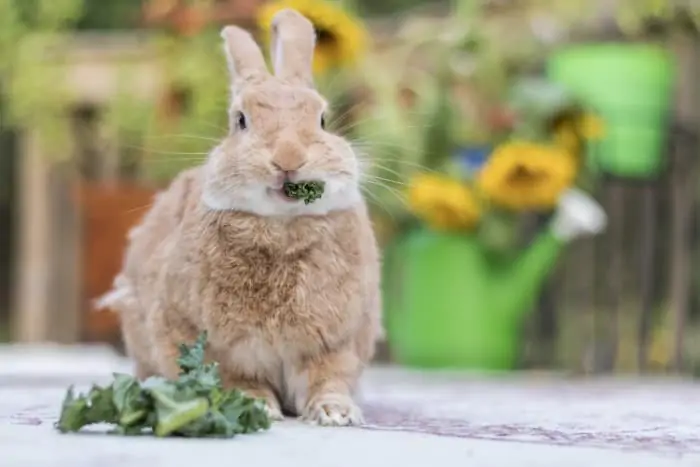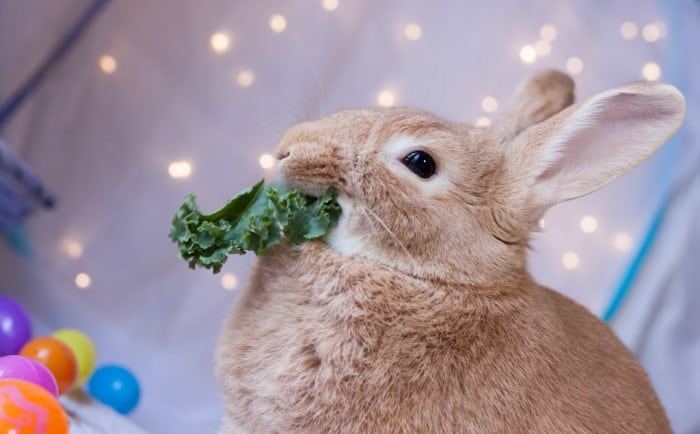As you continue to explore dietary options for bunnies, you may have wondered “Can rabbits eat kale”. Even though rabbits eat predominant hay, it does not mean that you cannot surprise their tastebuds with a variety of treats. Here we will discuss whether or not rabbits can have kale, its nutritional value, and much more. Let’s get into it!
Is Kale a safe vegetable for rabbits?
There are two schools of thought when it comes to kale. Some pet owners prefer not to give kale to their bunnies at all. Too much kale may cause bladder issues in rabbits. There are several healthier options. However, if you feed your rabbit a small amount of kale, two to three times a week, no harm will come to him or her. It can be added to the list of treats to enhance your rabbit’s choices.
What is the right way to serve kale to rabbits?
If you decide to feed your rabbit kale, you can safely do so if you cautiously follow certain guidelines.
Serving size
You can give your rabbit a piece of kale that is the size of your palm a couple of times per week without any adverse effects on your bun. If your rabbit is getting calcium and its other nutritional needs from other foods, you can scale back on the kale. As such you should keep track of how much calcium is already in your rabbit’s diet so that you can manage the amounts accordingly.
As mentioned before Kale should only be added as a supplement to an already balanced diet. It is a supporting act since kale cannot provide all the nutrients that your rabbit needs to be healthy.
When introducing new foods into your rabbit’s diet, you should offer them a little at first and then observe for any sign of intolerance. Signs of food intolerance in rabbits are:
- Loose stools/Diarhhea
- Constipation
- Vomiting
- Lethargy
- Lessen activity.
So, stay vigilant. However, on the upside, most rabbits tolerate small amounts of kale with no issues whatsoever.
You should also make sure that your kale is washed thoroughly, to ensure that all residual pesticides and chemicals are removed. Whenever possible try to buy organic. You may even want to experiment with a kitchen garden and grow your own kale, this way you know exactly what your bunny is eating.
Are all types of kale safe for bunnies?
As you may already know there are several types of kale. The following types of kale are the most common, here is some information on their suitability for bunnies
- Baby kale – yes, rabbits can eat baby kale. It’s thinner and more tender compared to other types of Kale. Your bunny can enjoy baby kale in moderation.
- Curly kale – this kale is also a wholesome choice for rabbits. It is richer in fiber than other types of kale which is always beneficial to rabbit health. Your bunny will certainly not refuse it.
- Red kale – it is also safe for bunnies once it is served in small amounts. Too much of it is not recommended.

- Redbor kale – this is the purple, curly kale that you may sometimes see in the supermarket. Yes, bunnies can have this type of kale, but it in small portions.
- Lacinato kale – this kale is very dark and thinner in appearance and texture. It is not curly. Bunnies will also happily partake of this type of kale.
What nutrients will my bunny get from kale?
You may know by now that kale is extremely nutritious and is packed full of vitamins and minerals that can positively affect your rabbit’s health. Here is a list of kale’s nutritional facts.
- Fiber – Kale is rich in fiber and as you know fiber is key in keeping your bun’s digestive system functioning as it should. While rabbits get most of their fiber from grass or hay, at least you know that if you feed your rabbit kale as a treat, it is in keeping with its dietary requirements
- Protein – Bunnies need protein just like we do. It provides rabbits with energy and is essential for healthy growth, especially for young rabbits. Proteins contain amino acids which are the building blocks of life. Your rabbit’s body needs protein to function efficiently, build muscle mass, and gain weight.
- Vitamin A – This vitamin helps maintain a healthy immune system, normal vision, and keeps reproductive organs in good working order. Vitamin A also helps your rabbit’s lungs, kidneys, heart, and other critical organs work properly.
- Vitamin C – Kale has trace amounts of this vitamin which is a good thing. Since rabbits do not need Vitamin C, they actually produce it themselves and if they ingest too much it will cause kidney damage.
- Vitamin K – This vitamin is important since it facilitates blood clotting and promotes accelerated wound healing. It also helps bones develop properly. This is particularly important if you have a baby bun. However, it is important to note that if rabbits have too much Vitamin K, they may suffer nephritis.
- Calcium – This mineral helps rabbits develop strong bones and teeth. It also helps keep your rabbit’s heart, muscle, and nervous system functioning properly. However, since kale is high in calcium, rabbits should have small portions. An excess of calcium can cause bladder stones.
- Magnesium – This mineral is essential for metabolic reactions. It also helps rabbits maintain a healthy blood pressure.
- Potassium
As you can tell even in small amounts, there are enormous health benefits for your rabbit if you decide to add it to her list of treats.
Can rabbits eat Kale stems?
Yes, they can, the stems are higher in fiber content than the rest of the plant. However, they require some prep for rabbits to consume them safely.
- Step 1 – Wash steps thoroughly.
- Step 2 – Cut them into small bite-size pieces. This way, your rabbit will not be at risk for any choking accidents.

Can I feed my rabbit canned or cooked Kale?
All vegetables that you offer your rabbits should be raw. Processed food has a softer consistency that is not well tolerated by bunnies. Canned foods will also have preservative chemicals that that may make your rabbit sick. As such, it is better that you err on the side of caution and stay away from any type of processed food for your rabbits.
Can rabbits eat frozen kale?
While you can get fresh kale at the farmers’ markets and supermarkets, it is often found in the frozen foods section. Actually, rabbits can have frozen kale, since while other vegetables’ structure may be compromised by the freezing process, kale remains the same.
Can baby rabbits eat Kale?
Your baby buns have immature digestive systems and should not be offered kale in small amounts until they are older. Also, when introducing new fruits and vegetables, be sure to introduce them one at a time and slowly. Keep a close eye on them in case, they are unable to tolerate their new treats.
Will wild rabbits eat kale?
They would eat kale if it was available. If they are able to tolerate it, they should not have more than what a domesticated rabbit would be fed.
What are some equally good kale alternatives for rabbits?
Here is our list of green leafy vegetables that are both safe and nutritious for bunnies. You should also note that these have a lower calcium content than kale.
- Romaine lettuce
- Mustard greens
- Cilantro
- Watercress
- Basil
- Bok choy
- Kohlrabi
- Broccoli
- Carrot tops
While we are discussing kale, we will take the opportunity to remind you of what a rabbit’s diet is supposed to look like.
- Hay and grass – Your rabbit’s diet should always maintain an 80% ratio of hay. Rabbits need a high fiber diet to maintain a healthy digestive system. As such, you should always have fresh clean hay in your rabbit’s cage or hutch. You will also notice that your rabbit is always nibbling.
- Fruits and vegetables -These food groups provide the vitamins and minerals that are required for growth and health. We suggest that you switch it up so that your rabbit has an exciting selection to sample.
- Pellets – Rabbit pellets are made from hay fortified with vitamins and minerals and they are optional. However, some pet owners like to have a supply of pellets on hand, and rabbits seem to love it!
- Water – Clean uncontaminated water is non-negotiable. If you have a water bowl in your rabbit’s cage, your rabbit may unwittingly step into his water bowl. So, change the water regularly, or you can look into a water dispenser that hangs on the side of the cage. This way the water stays cleaner for longer.
So, if you want to add kale to your rabbit’s dietary regime, you can do so in modest portions. They are purely supplemental but can be added to the variety of foods that you feed your rabbit. However, you should be mindful not to be heavy-handed with kale since it’s high in calcium and oxalates and may cause kidney and bladder issues. Moderation is always advised when it comes to fruits and vegetables in a rabbit’s diet.

